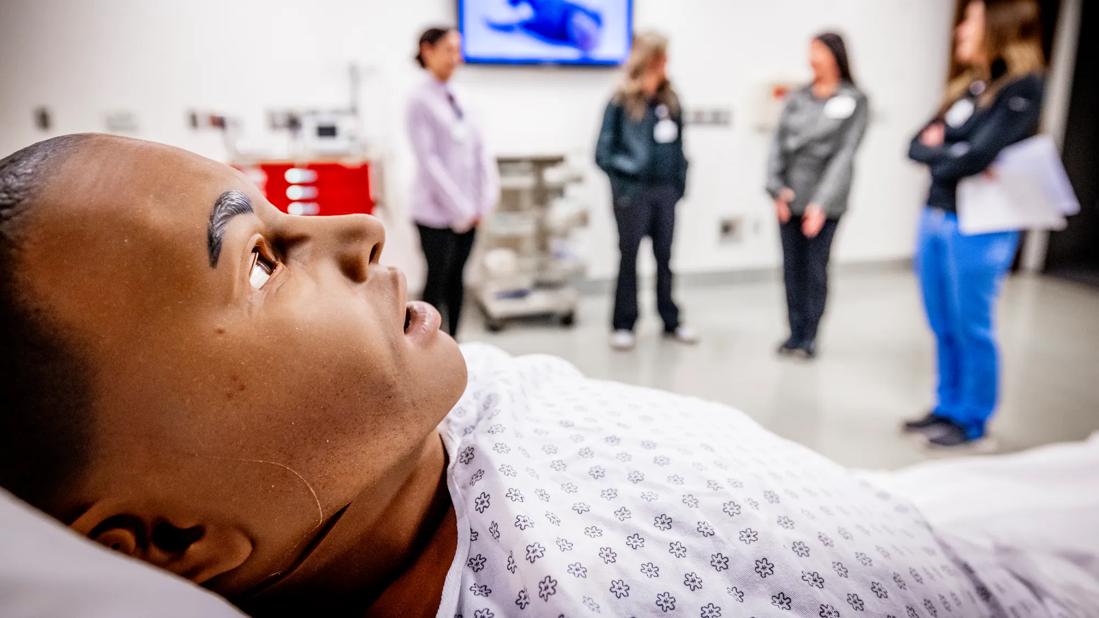Nurse associate externs practice patient care scenarios

Image content: This image is available to view online.
View image online (https://assets.clevelandclinic.org/transform/a733c513-6461-409a-a88d-afce023b8fa5/EDU_5965756_04-08-25_014_LDJ)
Nurse education
For nurses, job training and education is a life-long endeavor. And when you first become a nurse there is a lot to learn to get up to speed. With this in mind, Cleveland Clinic’s Nursing Education team is always thinking of new ways to engage nurses in the learning process.
Advertisement
Cleveland Clinic is a non-profit academic medical center. Advertising on our site helps support our mission. We do not endorse non-Cleveland Clinic products or services. Policy
“This new generation of caregivers doesn’t want to sit around for too long and listen to a lecture,” says Nursing Education Manager Jeanne Henry, MEd, BSN, BS, RN. “We have to find ways to engage our nurses in the real work of nursing so they become proficient quickly and learn how to work as a team.”
Enter the “escape room” gaming concept. In 2019, Nursing Education implemented an escape room training module as part of its Nurse Associate Externship (NAE). It got rave reviews from participants.
As part of the conclusion of the 10-week summer program, Nursing Education set up a series five experience rooms. It started with a first responder scenario where NAE teams had to orchestrate the right sequence of care. When completed correctly, they received a numeric code that opened a lock to collect a puzzle piece, which helped them “escape” to the next room for another scenario. The teams used the SBAR (Situation-Background-Assessment-Recommendation technique) communication criteria to solve a puzzle as a team to obtain a code to unlock the box for a puzzle piece. Experience room scenarios included identifying and staging of wound care (pictured above); telemetry tests with strips to interpret and identify rhythm; using QRS codes for sepsis identification, following the sepsis care path and selecting treatment; and finally, patient handoff.
After completing the five experience rooms, the team that completed the experiences the fastest and collected all of the puzzle pieces was the winning team. Seventy nurse associates participated in the training, organized into groups of five to seven per team.
Advertisement
“This interactive module reinforced the concepts of critical thinking and clinical judgment that they were learning,” explains Cindy Willis, DNP, MBA, RN, Senior Director of Nursing Education. “We wanted this experience to help them understand that they are individually accountable, but also that there will always be educators and colleagues to provide support. This was a great example of a team working together to care for patients.”
Following the escape room training experience, the teams had time to debrief and think about how they did. And a survey after this learning module indicated that it was a resounding success.
“Participants told us they had so much fun,” says Henry. “And based on this feedback, we see that it really was an effective educational experience to help nurses use their developing skills in a collaborative way.”
Nursing Education plans to include this training module again in its 2020 Nurse Residency Programs.
Advertisement
Advertisement
Harnessing digital innovations to enhance nurse confidence and clinical outcomes
Regional organizations collaborate to address nurse faculty shortage
How wellness habits help nurses flourish
Planning continues with critical, patient-focused input from nursing teams
Strengthening care through targeted resources and frontline voices
Embracing generational differences to create strong nursing teams
CRNA careers offer challenge and reward
An unexpected health scare provides a potent reminder of what patients need most from their caregivers